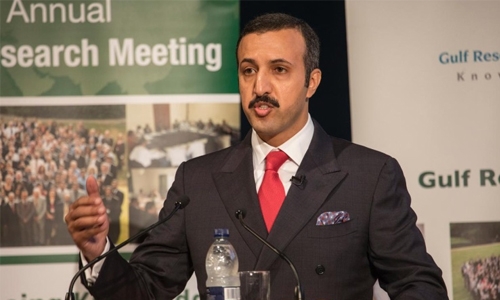‘War of ideas’ needed to confront extremism
Chairman of the Board of Trustees of the Bahrain Centre for Strategic, International and Energy Studies, Dr Shaikh Abdulla bin Ahmed Al Khalifa, has stressed that investing in strategic thoughts contributes effectively to bringing about the desired positive change by producing new inspirational visions and dynamics that would support peace, freedom and development, and at the same time, confront extremism and terrorism in all their forms.
Addressing the Gulf Research Meeting 2019, organised by the UK Cambridge University, Dr Shaikh Abdulla said that the Gulf region is in dire, more than any other part of the world, for investing in strategic thought, and for waging a “war of ideas” to confront the theocratic and extremist ideologies, after the prevalence of differences at the expense of coexistence, and chaos at the expense of stability, as well as the increase in the number of failed states or those on the verge of collapse.
He noted that many theories have attempted to explain the current situation in the region, such as “Filling the Void” or “Creative Chaos”, but the “Power” theory has dominated, and become the most dangerous as it derives its “fuel”, in most cases, from sectarian feelings, extremist ideas and hatred of the other. In this regard, he pointed out that Iran is the most prominent example, as it has proved, four decades after its revolution, that it is not a natural state, with its expansion-based and crisis-mongering approach aimed at stirring up conflicts, as well as sponsoring and harbouring terrorism, citing its interference in the internal affairs of the region’s countries, including Bahrain, where Iran-backed terrorist cells have been discovered.
He asserted that the Mullas Regime in Iran and the Takfiri (accusing others of being unbelievers in Islam) terrorism complete each other, despite their different names, as their doctrine and goals are the same-changing the world as per divine orders, which means, for both, that every terrorist act is legitimate and justified. DERASAT chairman went on to say that the Middle East region is currently going through a new crisis as a result of the recent escalation in the Arabian Gulf region caused by attacks on civilian oil tankers, and there is evidence of Iran’s responsibility over them.
The lecturer stressed that the Palestinian-Israeli conflict remains a permanent source of tension, noting that Bahrain, out of its desire to be an influential part in the solution to the problem, has hosted the “Prosperity for Peace” workshop as an initiative aimed at enhancing development, education and the quality of life for peoples of the region, especially the Palestinians, as well as creating a suitable environment for peace.
Dr Shaikh Abdulla said that the region has, over the past decade, witnessed a wave of violent changes that led to nothing but the collapse of national institutions, the increase of savage sectarian and ethnic conflicts and the obstruction of development plans, thus making reforms more difficult.
Related Posts

